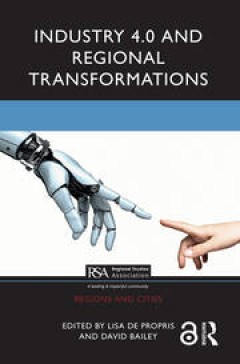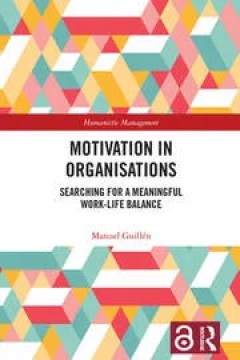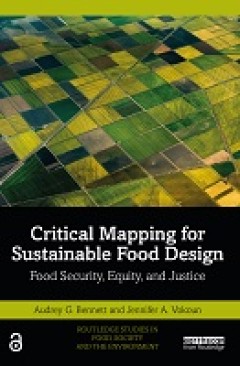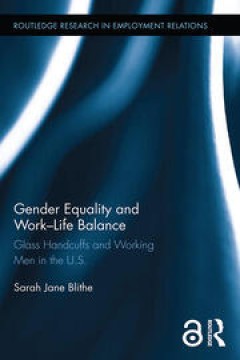Filter by

Industry 4.0 and Regional Transformations
ABSTRACT This edited volume brings together a group of expert contributors to explorebthe opportunities and the challenges that Industry 4.0 (smart manufacturing) is likely to pose for regions, fi rms and jobs in Europe. Drawing on theory and empirical cases, it considers emerging issues like servitization, new innovation models for local production systems and the increase in reshoring. In…
- Edition
- -
- ISBN/ISSN
- 9780429057984
- Collation
- -
- Series Title
- -
- Call Number
- -

The Ownership of the Firm, Corporate Finance, and Derivatives
This book clarifies several ambiguous arguments and claims in finance and the theory of the firm. It also serves as a bridge between derivatives, corporate finance and the theory of the firm. In addition to mathematical derivations and theories, the book also uses anecdotes and numerical examples to explain some unconventional concepts. The main arguments of the book are: (1) the ownership of t…
- Edition
- 1
- ISBN/ISSN
- 978-981-287-353-8
- Collation
- XII, 76, 11 b/w illustrations
- Series Title
- SpringerBriefs in Finance
- Call Number
- XII, 76, 11 b/w illust

The Paradox of Points
In his research, Sören Köcher provides valuable insights on the paradoxical effects of the magnitude of a loyalty program medium—i.e. the sheer number of points, miles, or stamps credited for every purchase and required for reward redemption—on the central consumer decisions in loyalty program memberships. In sum, the results of twelve empirical studies reveal that high magnitude currenci…
- Edition
- 1
- ISBN/ISSN
- 978-3-658-09543-7
- Collation
- -
- Series Title
- Applied Marketing Science / Angewandte Marketingforschung
- Call Number
- XIX, 163, 27 b/w illustrations

History and Political Economy
ABSTRACT Impressive and authoritative, this essential book brings together a collection of essays in honour of Peter Groenewegen, one of the most distinguished historians of economic thought of a generation. His work on a wide range of economic theorists such as Adam Smith, François Quesnay and Alfred Marshall approaches a level of near insuperability.
- Edition
- -
- ISBN/ISSN
- 9780203390658
- Collation
- -
- Series Title
- -
- Call Number
- -

Good Governance in Sport
ABSTRACT This book fills an important gap in the sport governance literature by engaging in critical reflection on the concept of ‘good governance’. It examines the theoretical perspectives that lead to different conceptualisations of governance and, therefore, to different standards for institutional quality. It explores the different practical strategies that have been employed to ach…
- Edition
- -
- ISBN/ISSN
- 9781003172833
- Collation
- -
- Series Title
- -
- Call Number
- -

Sexuality in the Swedish Police
ABSTRACT Sexuality in the Swedish Police is based on the experiences of lesbian, gay, and bisexual police officers and the author's observations of police work. Written at the intersection of organizational, gender, and police studies, the book analyses how processes of exclusion and inclusion of LGB sexuality coexist in the Swedish police, how these processes are related to the culture and ch…
- Edition
- -
- ISBN/ISSN
- 9781003242871
- Collation
- -
- Series Title
- -
- Call Number
- -

Motivation in Organisations
ABSTRACT Motivation in Organisations: Searching for a Meaningful Work-Life Balance extends the current motivation models in business education to include motives of human behaviour that have been neglected for decades. It debunks some of the myths about human motivation (self-interest as the dominant factor, amorality and non-spirituality) and explains why this approach to teaching business is…
- Edition
- -
- ISBN/ISSN
- 9780429317293
- Collation
- -
- Series Title
- -
- Call Number
- -

Chapter Introduction
Critical mapping—a problematizing, reflective approach to design inquiry—investigates how existing design outcomes (DOs) can be coupled to form a wicked solution to address a wicked problem. We have found that visual framing married to affinity organization is one of the most important strengths in critical mapping, helping to communicate the concepts to stakeholders, structure ou…
- Edition
- -
- ISBN/ISSN
- 9781032118895
- Collation
- Pages 9
- Series Title
- -
- Call Number
- -

Gender Equality and Work-Life Balance
ABSTRACT Pressure to achieve work-life "balance" has recently become a significant part of the cultural fabric of working life in United States. A very few privileged employees tout their ability to find balance between their careers and the rest of their lives, but most employees face considerable organizational and economic constraints which hamper their ability to maintain a reasonable "bal…
- Edition
- -
- ISBN/ISSN
- 9781315719191
- Collation
- -
- Series Title
- -
- Call Number
- -

Productivity Improvement in Manufacturing SMEs
ABSTRACT This book focuses on the application of workstudy in productivity of manufacturing SMEs locally and abroad and also explores various industrial problems which face manufacturing SMEs in developing and underdeveloped countries in the rest of the world. Low productivity is currently a serious challenge facing manufacturing SMEs, where these SMEs are operating below expected production o…
- Edition
- -
- ISBN/ISSN
- 9781315180311
- Collation
- -
- Series Title
- -
- Call Number
- -
 Computer Science, Information & General Works
Computer Science, Information & General Works  Philosophy & Psychology
Philosophy & Psychology  Religion
Religion  Social Sciences
Social Sciences  Language
Language  Pure Science
Pure Science  Applied Sciences
Applied Sciences  Art & Recreation
Art & Recreation  Literature
Literature  History & Geography
History & Geography